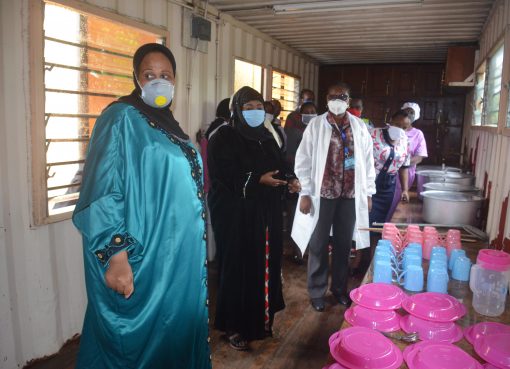Sylvia Kuria, 38 has been an organic farmer for the last 10 years in the semi-arid area of Ndeiya area of Kiambu County.
Surprisingly, the young farmer has no background in agriculture but has passionately succeeded in the alternative agricultural system.
Many people in the area and even her friends have always wondered of the sustainability of organic farming without use of synthetic fertiliser and pesticides.
“The secret is to start small. I started organic farming in a small farm about half an acre growing only my own family food. I decided to grow everything that my family requires instead of relying on produce sold in the local markets. Initially, it was difficult but I managed,” she says.
Speaking from her farm at Ndeiya, Limuru in Kiambu Ms. Kuria says one year after starting out she had managed to grow a variety of more than 25 vegetables producing enough to feed her family.
“With time, I had enough to eat and I started a scheme of selling the surplus in baskets in the nieghbourhood,” added the mother of three.
To her, organic agriculture is not just about growing safe food, but a combination of many components mainly the soil being the main ingredient for growing enough food.
Taking care of the soil every other season guarantees continuous adequate food production and also to cater for the generations to come.
“I chose organic agriculture because I want my soils to remain good in terms of nutrients and one that my children and great grandchildren will still depend on to grow their produce in years to come,” she remarked.
On Food safety Ms. Kuria told this writer that to ensure soil maintains quality, she does cover cropping by planting crops that are rich in fixing nitrogen into the soil such as legumes including cow peas, pigeon peas, beans and green grams.
“Doing so helps to renew the soil texture all the time and thus provides the organic matter or the ability by the soil to retain water, because, I do not have enough livestock to produce compost manure. I dig back leaves from beans back into the soil. It is also important to grow trees,” she says noting that food cannot be grown if there is no support of trees.
Kuria has grown more than 500 tree varieties in her five-acre farm and especially trees that fix nitrogen into the soil, provide shade when it is hot, and trees that provide fodder for the animals when it is dry such as the coriander which are good for the goats and fruit trees.
In her farm, Kuria also keeps few goats and chicken that provides manure which she mixes with kitchen and green waste and then uses the compost manure when planting her vegetables.
She emphasises that farmers and other producers have a responsibility to make sure that produced food is safe.
“It is my strongest conviction that with organic farming, am promoting good health to the consumers. People want to buy safe food. We owe this to the next generation,” said Kuria.
On the use of Pesticides, Kuria explained that in order to avoid use of synthetic pesticides she practices crop rotation by ensuring each portion of the land has a different crop every season.
“After I do one season of onions, I move to another place and grow another crop. I grow spring onions to prevent pests from attacking other crops. But we also make our own pesticides at home by mixing up chilli, garlic and crashed leaves of Muarubaini tree and use the concoction to spray pests,” she says.
Organic farming is characterised by preventative than controlling for example, it is easy to prevent pests and diseases when the plant is healthy.
Recently, during 1st International Conference on Agro-ecology Transforming Agriculture & Food Systems in Africa conference on agro-ecology researchers attributed soil infertility to low testing.
The experts said that for regular soil tests to be achieved, Government needs to establish more soil laboratories in addition to educating farmers on the importance of the same.
Prof. Ratemo Michieka from the University of Nairobi during the conference asked the state to subsidise the cost of essentials in soil testing.
“Misuse and excessive use of fertilisers in our fields are really degrading our soils, he added noting however that owing to the changing nature of the agriculture sector, even private sector players are today carrying out tests to ascertain the health of the soil.
Kuria takes her soil for testing at the University of Nairobi after every one and a half years, where a sample, is charged Sh.2, 000.
For organic farming to succeed, Kuria advised farmers to change their mindset and desist from using synthetic fertilizer to grow food.
“Conventional agriculture where farmers use synthetic inputs, does well in the first five to seven years then yields start reducing. While, in organic farming, the yields are low in the beginning but start to pick up in the sixth year and this goes on as long as you take care of the soil,” she said adding that, farmers using fertiliser say the productivity has been decreasing in last decade.
Kuria says her produce attracts consumers and she does home delivery to her customers in both Kiambu and Nairobi Counties.
She retails an assortment of vegetables in a basket at about Sh1, 000 and is quick to add that the cost however varies as she grows vegetables in seasons.
For example, in the rainy season Kuria grows cabbages, broccoli cauliflowers, carrots and all other vegetables that do well in the cool climate.
With these ones she sells more than 20 baskets of the assorted vegetables in a week. Every week she has about 50-60 kilos of broccoli, same for cauliflowers and 20-30 pieces of cabbages.
“Our target is to have a minimum of 20 baskets in a week. I used to grow everything all season and I realized I was not earning much yields. With time, I learnt that vegetables have seasons and that’s when I started growing specific vegetables at different seasons,” she said.
In the short rains of September-October-November, for instance, she grows tomatoes, cucumbers, gorgets, capsicum(bell peppers) and red onions.
In one basket, Kuria packs an assortment of 15 to 20 different vegetables at Sh.1, 000. The food, she says, is enough to feed a family of five to seven people for a week.
She desires to feed 500 homes a week and to achieve the same, she is planning to contract more farmers in Ndeiya area from next year.
“Part of my plan is to recruit fully my kids into organic farming. Though, currently I work with them, each managing a small portion. They do weeding and sometimes accompany me to town when going to sell the produce,” she adds.
Organised organic farming appears to have started in Kenya in the 1990s. In 2005, large scale and commercial farmers involved in organic export together with other stakeholders organised themselves into Kenya Organic Association Network (KOAN) to continue support to the growth of the organic sub-sector
Currently, the organic food produced for the export and domestic markets totals at least 5 million tonnes annually.
There are at least 250, 000 consumers of organic produce comprising of local citizens and tourists mainly in Nairobi.
The organic food consumers have been identified as such from being regular customers at the organic markets and outlets.
Since most of the current organic farming takes place in Central Kenya, a lot of potential for production exists in other regions such as the Coast, Eastern, Rift Valley, Western, Nyanza and North Eastern
By Wangari Ndirangu



